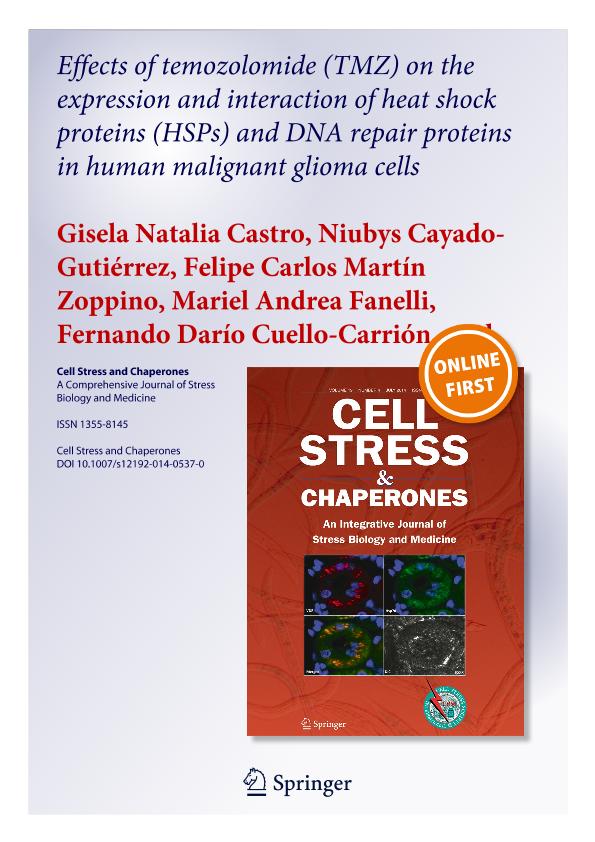Artículo
Effects of temozolomide (TMZ) on the expression and interaction of heat shock proteins (HSPs) and DNA repair proteins in human malignant glioma cells
Castro, Gisela Natalia ; Cayado Gutiérrez, Niubys de Los Milagros
; Cayado Gutiérrez, Niubys de Los Milagros ; Zoppino, Felipe Carlos Martin
; Zoppino, Felipe Carlos Martin ; Fanelli, Mariel Andrea
; Fanelli, Mariel Andrea ; Cuello Carrión, Fernando Darío
; Cuello Carrión, Fernando Darío ; Sottile Fleury, Mayra Lis
; Sottile Fleury, Mayra Lis ; Nadin, Silvina Beatriz
; Nadin, Silvina Beatriz ; Ciocca, Daniel Ramon
; Ciocca, Daniel Ramon
 ; Cayado Gutiérrez, Niubys de Los Milagros
; Cayado Gutiérrez, Niubys de Los Milagros ; Zoppino, Felipe Carlos Martin
; Zoppino, Felipe Carlos Martin ; Fanelli, Mariel Andrea
; Fanelli, Mariel Andrea ; Cuello Carrión, Fernando Darío
; Cuello Carrión, Fernando Darío ; Sottile Fleury, Mayra Lis
; Sottile Fleury, Mayra Lis ; Nadin, Silvina Beatriz
; Nadin, Silvina Beatriz ; Ciocca, Daniel Ramon
; Ciocca, Daniel Ramon
Fecha de publicación:
08/2014
Editorial:
Springer
Revista:
Cell Stress & Chaperones
ISSN:
1355-8145
e-ISSN:
1466-1268
Idioma:
Inglés
Tipo de recurso:
Artículo publicado
Clasificación temática:
Resumen
We previously reported the association of HSPA1A and HSPB1 with high-grade astrocytomas, suggesting that these proteins might be involved in disease outcome and response to treatment. With the aim to better understand the resistance/susceptibility processes associated to temozolomide (TMZ) treatment, the current study was performed in three human malignant glioma cell lines by focusing on several levels: (a) apoptotic index and senescence, (b) DNA damage, and (c) interaction of HSPB1 with players of the DNA damage response. Three human glioma cell lines, Gli36, U87, and DBTRG, were treated with TMZ evaluating cell viability and survival, apoptosis, senescence, and comets (comet assay). The expression of HSPA (HSPA1A and HSPA8), HSPB1, O6-methylguanine-DNA methyltransferase (MGMT), MLH1, and MSH2 was determined by immunocytochemistry, immunofluorescence, and Western blot. Immunoprecipitation was used to analyze protein interaction. The cell lines exhibited differences in viability, apoptosis, and senescence after TMZ administration. We then focused on Gli36 cells (relatively unstudied) which showed very low recovery capacity following TMZ treatment, and this was related to high DNA damage levels; however, the cells maintained their viability. In these cells, MGMT, MSH2, HSPA, and HSPB1 levels increased significantly after TMZ administration. In addition, MSH2 and HSPB1 proteins appeared co-localized by confocal microscopy. This co-localization increased after TMZ treatment, and in immunoprecipitation analysis, MSH2 and HSPB1 appeared interacting. In contrast, HSPB1 did not interact with MGMT. We show in glioma cells the biological effects of TMZ and how this drug affects the expression levels of heat shock proteins (HSPs), MGMT, MSH2, and MLH1. In Gli36 cells, the results suggest that interactions between HSPB1 and MSH2, including co-nuclear localization, may be important in determining cell sensitivity to TMZ.
Palabras clave:
Temozolomide
,
Glioma
,
Hspb1
,
Msh2
,
Mgmt
Archivos asociados
Licencia
Identificadores
Colecciones
Articulos(IMBECU)
Articulos de INST. DE MEDICINA Y BIO. EXP. DE CUYO
Articulos de INST. DE MEDICINA Y BIO. EXP. DE CUYO
Citación
Castro, Gisela Natalia; Cayado Gutiérrez, Niubys de Los Milagros; Zoppino, Felipe Carlos Martin; Fanelli, Mariel Andrea; Cuello Carrión, Fernando Darío; et al.; Effects of temozolomide (TMZ) on the expression and interaction of heat shock proteins (HSPs) and DNA repair proteins in human malignant glioma cells; Springer; Cell Stress & Chaperones; 20; 2; 8-2014; 253-265
Compartir
Altmétricas



